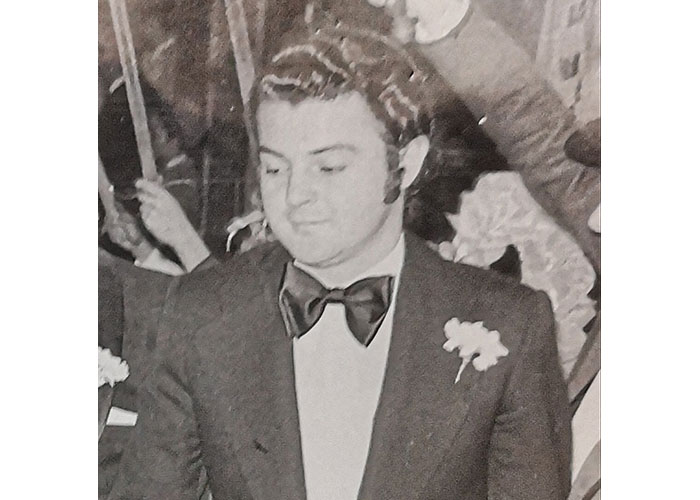Many international film-TV executives would be startled to learn that what contributed to the media fortunes of two Greek families — the Kouroglou clan and the Triantafyllis tribe — was Nudist Paradise, a 1959 English pseudo-exploitation sex film that the British Film Institute (BFI) now classifies as a “drama.”
This “Hall of Fame” story also checks in with each of the two families’ sons, both of whom followed in their fathers’ footsteps. Theo Kouroglou spent his formative years in Germany, while John Triantafyllis grew up in the U.S.
The 72-minute Nudist Paradise — which was released in the U.S. as Nature’s Paradise, and which was directed by Charles Saunders — was about an American man who fell in love with a British nudist.
Here’s how international TV executive Theodoros (Theo) Kouroglou recalled it: “In 1963, my father, John, rented a 193-seat movie theater in downtown Athens, the Cine Averov, then a four-year-old establishment, from the Baron Michael Tositsas Establishment. In 1967, John Michael Triantafyllis, the founder of the JT TV Film company, asked my father if he was interested in showing Nudist Paradise, a movie he had just bought and subtitled in Greek.” At that time the movie rights-holder paid the theater owner 25 to 45 percent of the gross ticket sales.
Triantafyllis (1910-1982) was a Greek actor/producer who in 1929 produced, directed, and starred in Four Greeks From America, a locally-produced Western movie. He founded JT Film in 1939 to acquire movies for the Greek market, as well as to produce and direct several domestic movies that he also distributed overseas. The company was renamed JT TV Film when Triantafyllis entered the TV business by distributing ITC titles. His son, John Michael Triantafyllis the seventh, took over JT TV Film — which he still runs today — in 1976 (at age 26), when he returned to Greece after a nine-year residence in the U.S.
“However,” Theo continued, “the 10 major theaters in Athens also demanded a minimum ticket sales guarantee from the movie rights-holder, and after the minimum was reached, the theaters would keep up to 45 percent of ticket sales.” If the agreed minimum wasn’t reached, the movie owner ended up paying the theater the difference between the sales total and the guarantee. In addition, cinema tickets in Greece were heavily taxed (with five different taxes).
“My father gave Triantafyllis a better trial deal, and Nudist Paradise filled the theater’s seats for 17 straight weeks with 14 sold-out showings per day, from 9 a.m. to 11 p.m., until it was eventually shot down by [the military government’s] censors.” This was despite the fact that the original 72-minute film had already been cut down to 45 minutes in Greece, and was promoted as a documentary.
Triantafyllis disputed this account, stating that his father owned seven cinemas in and around Athens, therefore he didn’t need Kouroglou’s Cine Averov. However, Triantafyllis declined to provide further information. When Theo was made aware of the dispute, he commented: “I suppose Triantafyllis’ seven cinema theaters came at a later time. Nudist Paradise was not a blockbuster and Averov cinema was not a premium class theater. Triantafyllis Senior never expected Nudist Paradise to be something more than a movie of second class.” He then added: “The strange thing about that story is that a low-quality and a low-budget movie shown in a second-class theater (that usually sold 150-300 tickets per day) sold the unbelievably huge number of 1,900 tickets on just the premiere day, something that no one could have imagined, not even in a dream.”
Considering the country’s sensitivity toward nudity, it is ironic then, that in 1931, it was Greece that had produced Daphnis and Chloe (from director Orestis Laskos), which was the first romantic film in Europe to contain nude scenes.
The Cine Averov, where Nudist Paradise was shown, also presents some interesting family links: The cinema’s owner, Baron Michael Tositsas (1885–1950) — also known as Baron Michael Tossizza due to the extensive amount of time he spent in Italy — was the grandson of Konstantinos Tositsas, who had moved to Livorno, Italy, at the beginning of the 19th century. In 1831, Konstantinos and his descendants were awarded the title of Baron by the local Duke. Baron Michael Tossizza studied in Italy and France and then worked for the family’s banking business in Paris. The Baron adopted Evangelos Averof-Tositsas (1910-1990), who founded Cine Averov, which is still run by Theo’s brother Chris today.
Averof, a Greek politician and author, also ran the Foundation of Baron Michael Tositsas, and was involved in a political controversy that was documented in the book, A Man, by Italian journalist Oriana Fallaci.
Theo’s father, John, had entered the movie business in 1958 at the age of 40 when he co-founded Acropolis Film with Nick Groumbas, who booked films for theaters in Athens.
Before that, John had been in the food business. But he decided to enter the film biz instead following a number of disputes with his partners.
When Groumbas died in 1966 at age 45, the Kouroglou family (John and sons Theo and Chris) took over full ownership.
Theo, who entered the film business in 1959 at the rather young age of 11, recalled that those years were the golden era of film in Greece, with 120 winter cinemas (open from September to April) and 250 open-air summer cinemas (open from April to September) in Attica (the region in and around Athens). However, he specified that “Cine Averov was a winter cinema — open all year long.”
According to Maria Chalkou’s 2008 paper for the University of Glasgow, “Towards the Creation of ‘Quality’ Greek National Cinema in the 1960s,” in 1968, cinema admission in Greece reached its peak with 137 million tickets sold. The annual domestic film output was 100 movies a year from over 200 local production companies, while imported films reached 560 titles.
That era saw the huge success of the 1960 Greek film Never on Sunday, which was nominated for five Oscars, and starred Greek actor Melina Mercouri. In 1964, another Greek movie, Zorba the Greek with Mexican actor Anthony Quinn, won three Oscars. And in 1969, Costa-Gavras’ film Z was nominated for two Oscars.
In Hollywood, Greek-born Spyros P. Skouras (1893-1971) was the president of, as well as a major shareholder in, 20th Century Fox (1942-1962). Years later, Jim Gianopulos, a second-generation Greek-American, became chairman of 20th Century Fox (2000-2016). He’s now chairman of Paramount Pictures.
In Greece, this golden era for movies lasted up until 1974, eight years after the first regularly scheduled black-and-white TV broadcast from government network ERT. From 1967 to 1974, television was mainly used as a propaganda tool by the Greek military junta (a.k.a. the Regime of the Colonels). Therefore, it was only after democracy was restored in 1974 that television became popular enough to cause a reduction in the number of filmgoers in the country.
The theater business in Greece was dealt another blow in 1979 by the introduction of home videos. But it wasn’t until 1989 — when color television finally bloomed in the country — that the beginning of the end for the cinemas was really felt. (In Greece, color television had started in 1977 with the French SECAM standard, but it switched to the German PAL in 1992. The year 1989 also marked the arrival of the country’s first private TV network, MEGA, which, recently closed down after 29 years of service.)
Acropolis Film stayed in business until 1998 when John Kouroglou retired at 80 years old. He died in 2007. The company had produced low-budget comedies and melodramas (since 1959 and throughout the 1960s). During the Junta’s reign it distributed Turkish films.
Theo assisted his father in the film business up until his high school graduation. During that time he accompanied him on various business trips. “Since 1968 I used to visit Rome with my father,” he said. “There, we acquired the theatrical rights [to a number of films] for cinema distribution in Greece and Cyprus. I spent many hours at the Cineriz (or Cinema Rizzoli) projection rooms in Via Veneto and Titanus Film, both in Rome.”
The young Kouroglou took a break from the film business when he left for Germany, first attending Tübingen University, and later, Regenesburg University. Theo chose Germany because he spoke German, a language he learned in school.
But in 1972 he re-immersed himself in his father’s business by attending a string of markets and festivals (Cannes in May, San Sebastian in September, MIFED in October, and the Tehran Film Festival in December “as a guest of Queen Soraya [the second wife of Shah Reza Pahlavi] where I lived in an atmosphere of One Thousand and One Arabian Nights,” he recalled). In 1975, he attended those same markets, as well as the Berlin Film Fest.
It was in Berlin that Theo successfully sold The Teacher With Blonde Hair, the first Greek film dubbed into English, which was produced in 1970 by Finos Film — then the biggest film production company in Greece.
Of those years, Theo likes to recount the time when, “it must have been 1975 or ’76 when I acquired, against the advice of my father, the rights to The Invisible Man, a film I much liked, from an Italian production and distribution company (possibly PAC). The film bombed in Greece. However, a few years later, a similarly titled movie with a similar storyline became a huge success in the same Greek cinemas.”
When his father also started a car sales company in 1977, John Kouroglou & Sons, Theo moved to the new company to serve as managing partner. He remained there for nine years. In fact, he was so taken by the car sales business that he returned to Germany in 1986 to coordinate the imports of German cars to Greece. He remained in that position for an additional five years, traveling back and forth regularly between Nuremberg and Athens. He returned permanently to Athens in 1991 to start his own car sales company, which, unfortunately, did not do well. In 1995, he accepted a two-year management position with the Greek-subsidiary of Zanussi, an Italian appliance company. That same year, his father and brother closed the John Kouroglou & Sons car company.
After Zanussi, Theo moved to two IT companies (in 1997 and 1998), both of which were based in Athens. Then, in 1999, he timidly returned to the audiovisual industry with a business focused on the replication and mastering of videocassettes, CDs, and DVDs, which allowed him to begin attending markets such as MIFED again in 2001.
For Theo, show business’ true callback came shortly thereafter, in 2006, when he was tapped as a Content Acquisition manager for Greek regional TV network Largovidiaria TV 0-6. By then, he had been out of the audiovisual industry for over 20 years. Theo explained that the station was tagged 0-6 because it catered to children ages zero to six years old. The station was subsequently rebranded as Smile TV by its owner, Largovidiaria’s Stergios Kalogiros, who is a Greek Balkan Vlach. In the Balkan’s Vlach dialect (which is spoken in Greek Macedonia), Largovidiaria means “television.”
After a two-year stint with TV 0-6, he accepted a sales position with Italian children’s TV animation company, Mondo TV, responsible for sales to Greece, Cyprus, former Yugoslavian countries, as well as Bulgaria, Romania, Kazakhstan, and German-speaking territories. He remained there until his retirement in 2011.
(By Dom Serafini)
Audio PlayerAudio Version (a DV Works service)










Leave A Comment